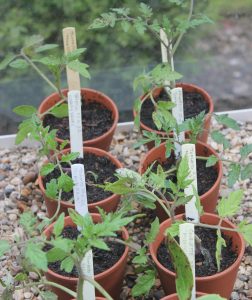Sow broad beans, spinach, cabbage, calabrese, kohlrabi, cauliflower, lettuce, peas for pods and shoots, onions, salad onions, turnip, radish, beetroot, leeks, leaf beat and chard under glass in pots or modules for later transplanting outdoors. Sow bunching onions, beetroot and round rooted carrots in pots for later transplanting outdoors.
From the middle of the month onwards, sow dill, basil, coriander, sweetcorn and tomatoes for later transplanting.
Sow melons, squash and cucumber seeds on edge in modules or 7.5cm pots of multipurpose or John Innes no 1 potting compost ready for planting out in May once the danger of frost has passed. They can be germinated in a propagator at 15-18C (60-65F), keeping the compost moist with tepid water.
Protect peas, broad beans and sweetcorn from mice using covers or humane traps.
If there is a combination of warm days and cold nights, it is a good time to sow parsley as the ‘highs and low’s break the seed dormancy. Always use fresh seed as viability is short. Sow celeriac, spinach and turnip early in the month in peat free seed compost, or finely sieved multipurpose compost, larger seeds like peas and beans can be sown in straight multipurpose compost having picked out larger uncomposted pieces.

Spare seed can be grown as fast-growing ‘microgreens’ in plastic take away containers, with 1cm of compost or two or three layers of kitchen towel in the base as you did as a child. Scatter seeds over the surface, making sure they do not clump together. Keep them well watered and harvest with scissors when they are around 5cm tall. You may get up to three crops, depending on the plant. Try fenugreek, brassicas, parsley, carrot leaves, radish and beetroot – it is well worth experimenting.
Keep the greenhouse well-ventilated during warm periods – you may find yourself opening and closing the vents several times a day and cover tender plants with fleece at night if the greenhouse is unheated; shade seedlings with newspaper or fleece on hot sunny days, to prevent them from scorching.
Repot tender plants into new peat free compost before they start into growth. Organic composts break down after a couple of years in warm conditions, so fresh compost is essential to replenish nutrients and maintain a good compost structure and growth. In the years you do not repot, remove the top 5cm of compost and top dress with new compost.
Tomato, Aubergine, Pepper and Chilli Plug plants will need potting on several times before moving to their final position in pots or the greenhouse border. Check root growth regularly, they are growing very quickly and soon become pot bound.
If you are sowing half hardy ‘Morning Glory’/‘Ipomoea’, soak the seeds in tepid water for 24 hours then sow at 20C in small pots or modules, to avoid root disturbance when transplanting, then grow on in cooler conditions and ‘harden off’ when temperatures have increased. Be gentle with them as they are cold sensitive, if chilled, they show their disapproval with pale yellow or white leaves, growth is checked; sometimes they will not even recover.
Happy Gardening. Matt


